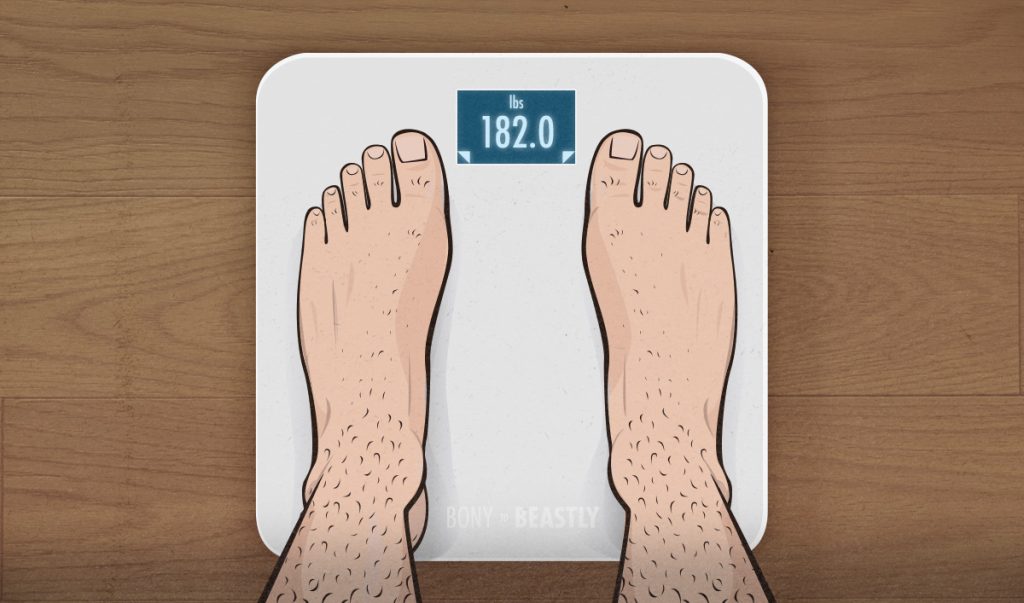
How to Gain Weight If You’re Skinny
Sometimes you’ll find an article about how to gain weight that doesn’t quite make sense. It’s not that it’s wrong, it’s just that it’s clearly written by someone who isn’t skinny and who’s never struggled to gain weight. They just don’t get how tough it is for us skinny guys to gain weight.
It’s like an obese person taking weight-loss advice from someone who’s naturally skinny. The skinny guy would confidently say, “Well, yeah, just stop eating. It’s easy. I do it all the time.”
It took me years to realize how much fitness information is really weight-loss information in disguise. It took me even longer to figure out how to convert all of it into information that skinny guys can use. And longer still to break it down into five simple concepts.
This article is written by a skinny guy who has spent the past eight years helping other skinny guys bulk up. If you put this information into action, it will help you gain weight, just like it did for the thousands of members in our bulking program.
Eat More Food Than Your Body Needs—Consistently
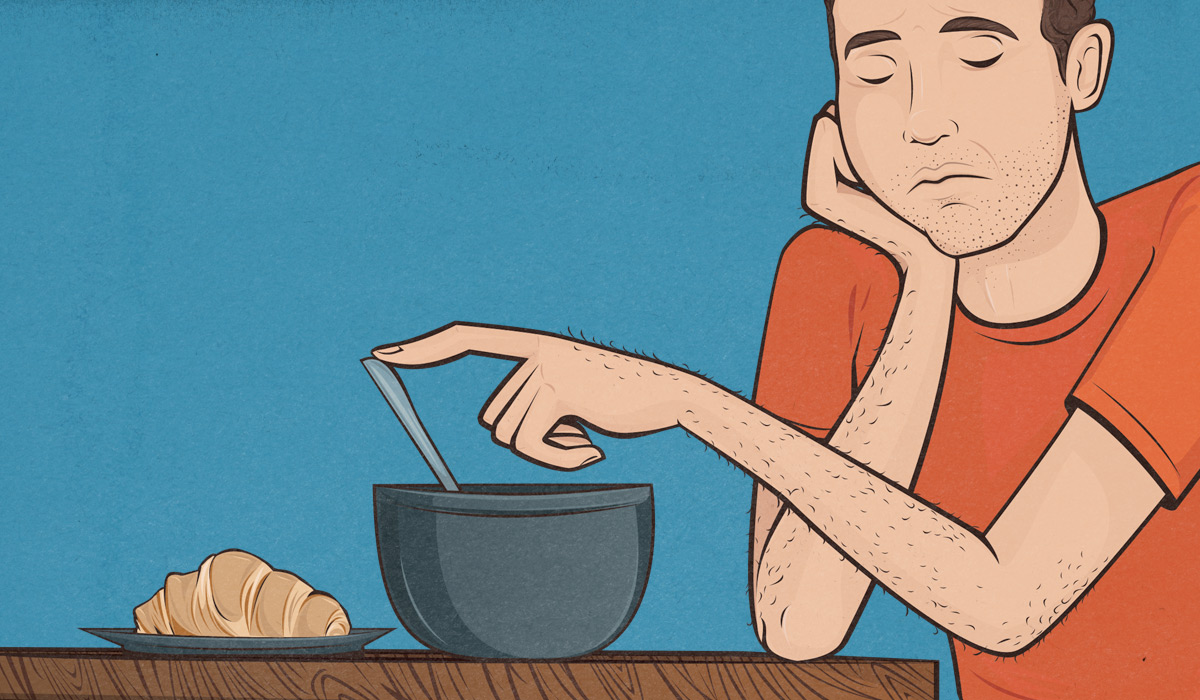
Your body gets the energy that it needs from food. Your body then uses this energy to breathe, generate new cells, think, move around, and build muscle. If you want to gain weight, you’ll need to eat more energy than your body needs.
The average writer will gloss over this part. They might say something along the lines of “just eat more.” Worse, they may even lecture us about how we “obviously don’t eat very much food because we’re skinny.” Maybe they’ll go so far as to tell us to eat in a calorie surplus of, say, 500 calories. And that’s it. They’ll move on to the next point.
We may indeed need to eat more, but simply telling us that won’t help us actually do it. Eating more calories isn’t easy. If we simply try to force-feed ourselves, we’re extremely unlikely to succeed. I’ve tried it. You probably have, too.
We’re skinny guys, too. We know how hard it is to gain weight. The skinny struggle is real.
I remember back in the day, back when I was skinny, I would often eat an obscene amount of food. I calculated my calorie intake one day, and I had eaten well over 3200 calories.
So how come I wasn’t gaining weight?
There’s this scientific term: homeostasis. It describes the physiological process where a variable is held constant through active regulation.
What does that even mean?
It means our bodies are actively trying to maintain their current weight.
If you eat more energy than your body needs, what do you think your body will do with that extra energy? A naturally fat guy might store that weight, but as hardgainers, we may simply burn off those extra calories as extra body heat.
Every body tries to maintain its current weight, but our bodies are especially good at it. It’s harder for us to gain weight than it is for most other people.
You may notice that you start to fidget more. You might feel energized to go for a walk or play some sports. You might even burn extra calories by thinking more deeply.
If you still have a surplus after all of that, your body will approach the problem from another angle—by limiting the amount of food coming in. The next day you might forget to eat a meal, or perhaps you choose smaller serving sizes, or maybe you skip dessert.
So one day I ate a whole 1200-calorie bag of chips, a box of cookies, and a pint of ice cream on top of my regular meals. That might be enough to cause weight gain that day. But what happened the next day?
The next day, I probably moved more or thought more, or maybe I ate less. And that balanced everything out. No weight gain for me.
If you’re struggling to gain weight, too, it’s likely because you’re running into that exact same issue. Every time you get ahead on calories, your body cancels out your efforts retroactively.
So here’s how to beat your body’s natural systems:
- Track your energy objectively through an app like MyFitnessPal. If you try to “just eat more,” you won’t remember that you’re forgetting things. If this sounds crazy, it’s just because you don’t remember all the times it happened to you!
- Track your calories weekly, too. You might eat a lot of food 6 out of 7 days, be on track to gain weight, and then under-eat on the 7th day because you’re busy or stressed. That could wipe out all that extra energy you stored up over the week.
Eating More Can Be Tough
What if you find it hard to eat more than you need? Shane’s written an article explaining why it’s so hard for ectomorphs to gain weight, and another article detailing how to eat more calories. Here are some quick tips:
- Drink your calories. Drinking calories doesn’t make us feel full in the same way as chewing our food. Smoothies, protein shakes and milk are excellent choices. In our bulking program, we have dozens of recipes, including a recipe for a homemade 1000-calorie workout drink.
- Eat foods that are less filling. Foods that have less fibre (like nuts) and less water (like dried fruits) tend to be less filling. This makes foods like trail mix great for sneaking in extra calories. Here are some examples of foods that are great for bulking.
- Eat more often. Studies show that those who snack between meals eat more calories than those who eat larger meals less often.
- Make your food taste incredible. A bit of salt, sugar, and oil goes a long way. It’s pretty hard to eat a lot of plain boiled chicken wings—even just writing that is making me less hungry—but if you make a delicious homemade sauce, you can eat wings forever. (And no, a little salt, oil and sugar will not make you gain more fat while bulking.)
- Add a variety of foods and flavours to your diet. Studies have shown that if you eat foods with different flavours during a meal, you’ll eat more. Perhaps this is one contributor to why so many people gain weight during Thanksgiving and Christmas potluck dinners, where there are twenty different flavours to taste.
How Much More Should I Eat?
A conservative (aka slow, lean gains) starting point is to take your body weight and multiply it by 18. So if you weigh 130 pounds, you’d start off eating around 2300-2400 per day. Since you’ll also be tracking your calories daily, your weekly goal will be 16,380 calories.
If you’re already tracking your calorie intake, even better—increase your daily calories by 250, which should get you gaining about half a pound per week.
What if you do this and you don’t gain weight? We’ll answer this in a second.
Don’t Just Gain Weight, Build Muscle
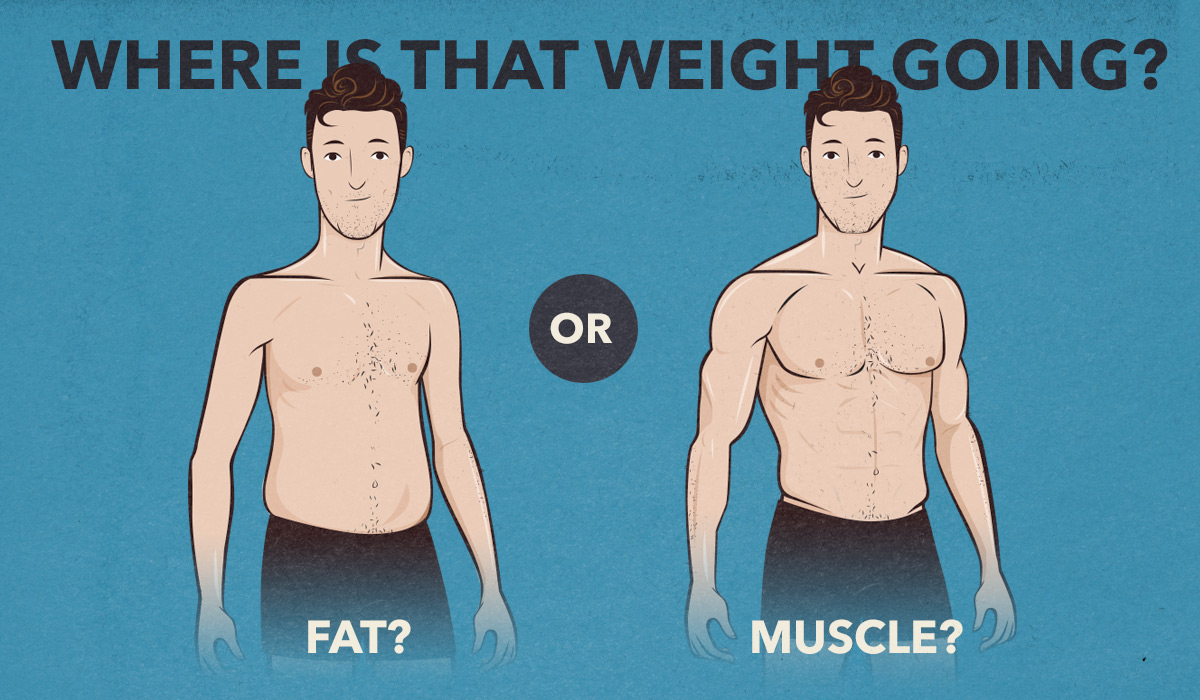
Okay. Now that you’re eating more food than you need, and you keep it up, where does all this extra energy go?
Well, if the closest you get to lifting weights is sitting here reading about them on this blog, that energy is going to be stored as fat.
If you’re a see-your-rib-cage kind of skinny, like we were, you might not care if you gain fat. In fact, if you’re under 10% body fat, gaining some fat could even be healthy for you.
But if your goal is to take up more space, look better, stand taller, and be stronger, you’ll still want to build mostly muscle with all that extra energy. Even if you’re starting out at 8% body fat, wouldn’t it be great if you gained twenty pounds of muscle before you hit a nice, healthy 10%?
So how do you tell your body to take that extra energy and turn it into muscle instead of fat?
The answer is by lifting weights and eating enough protein to support muscle growth.
HEADS UP: It’s important to remember that you shouldn’t increase the amount of food you’re eating until after you start working out. If you start eating big before you start lifting weights, you’ll be gaining mostly fat until you start your lifting program.
Skinny Guys Need to Lift Weights
The simplest way of putting it is, lifting weights helps you build muscle because when you stress your muscles enough, your body thinks that it must need bigger muscles to better handle that kind of stress.
The complicated answer, well, gets quite complicated. If you’re a curious fellow, Shane’s written an excellent article about which type of workouts are the best for helping skinny guys build muscle. It covers all the popular methods of working out and gives their pros and cons.
There’s a lot of science available now about how to build muscle optimally. And we integrated and considered all of it when putting together our program. You just do it and know that it works.
We would highly recommend that you do not make your own workout. There’s a lot to consider regarding movement patterns, volume, intensity, injury prevention, progression, picking exercises to match your skill level, and even behavioural tricks to make working out more addictive.
If you haven’t studied how to design workout programs, you could injure yourself, becoming skinny-fat, or just waste months of your life by failing to gain weight—again.
Lifting is not so unlike eating. Your body will usually get tired or lazy at the homeostasis point. If you wing it, you’ll probably stop your workout at the exact moment that will have you perfectly maintaining your results. Automatic plateau.
How Much Protein Do You Need While Bulking?
Muscle requires protein. To build new muscle, you’ll need more protein in your diet than someone who isn’t trying to build muscle. And the average guy under-eats protein anyway. So you probably need to eat more.
But eating enough protein is hard for a couple of reasons.
The first issue is that protein is incredibly filling. Try eating three chicken breasts and tell me you’re still hungry. Having a protein shake like whey makes this a lot easier as it uses the tricks from earlier (no chewing and no fibre). If you want to see what protein powders we recommend, see our bulking supplement guide.
The second issue is that protein is expensive. Whey protein powder tends to be cheaper per gram than eating chicken, so it’s possible that protein supplements could be helpful in keeping your costs down. Keep in mind that not all your protein needs to come from animal sources. There’s a little bit of protein in beans and nuts, which will get automatically tracked in your tracking app. If you’re eating lots of food in general, and you will be, then all those little bits of extra protein will help you reach your goals.
But what should a skinny guy’s daily protein goal be? Make sure to get at least 1 gram of protein per pound body weight (2.2 grams per kilo). Here’s Shane’s article going into depth on the ideal macros for a skinny guy who’s trying to bulk up.
Rest Well

When you stress your body, your body uses sleep to recover from that stress. Without proper rest, your hormones get bent all out of shape. When that happens, your body is more likely to store the extra energy you’re eating as fat (study, study). If you’re a skinny guy who’s gaining weight quickly, that can lead to quite a bit of extra fat gain.
Being sleep deprived is catabolic, which is a fancy way of saying that it puts you into a state where you break down more muscle mass. Sleeping well is anabolic, meaning you’ll build more muscle and store less fat.
If gaining weight and building muscle is important to you, you should make an effort to improve your sleep.
Some extra bonuses from sleeping enough are:
- You’ll look better
- You’ll be smarter
How do you rest well? You’ll need to sleep enough and also get good sleep. So the quantity and the quality matters.
Most of the research says that if you’re one of the overwhelming majority, you’ll need at least 7.25 hours, and probably closer to 8 hours, of sleep every single night.
Okay, so how do you improve the quality of your sleep?
- Sleep in a quiet bedroom. If you live in the city, use a noise machine to cover up startling sounds (loud drunk people, sirens, dogs barking)
- Sleep in a dark bedroom. Get blackout curtains to block out streetlights or be thankful that you live in the country-side.
- Sleep in a climate-controlled room. Keep it cool enough that you can use at least one blanket. Having a blanket will prevent rapid heat changes that can disrupt your sleep.
- Avoid screens 1–2 hours before you go to bed. I know it’s the 21st century, and this is incredibly hard, so just get F.lux to reduce the effect. Or take baby steps and listen to podcasts/radio pre-bed.
- Try not to eat within 30 minutes of going to bed. If you’re trying to gain weight, this might mean cramming calories in right until you go to bed. But if you can do it a bit earlier, your sleep may be better.
Gaining Weight Requires Measuring & Pivoting
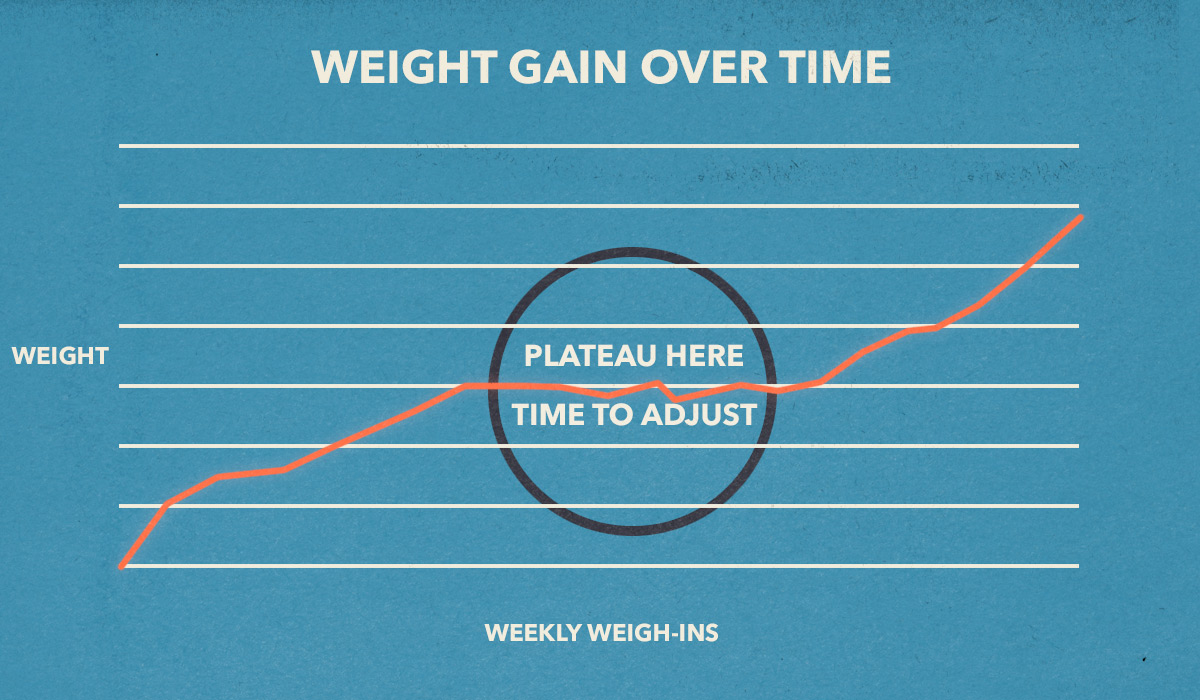
The masses often paraphrase Peter Drucker as having written, “What get’s measured, gets managed.” And he’s 100% right.
If we want to gain weight as naturally skinny guys, we can’t just do what we naturally do… because we’re naturally skinny. But the good news is that once we gain weight, that becomes the new natural. (Remember that homeostasis effect? It will help you stay big and muscular too.)
So if you want to gain weight, you’ll need to measure your weight each week. Make sense?
Buy a digital scale; they’re more accurate out of the box than a mechanical one.
Weigh yourself once a week right after you wake up and use the washroom. Alternatively, you can also weigh yourself daily and then divide the number by 7 at the end of the week. It’s normal for your weight to fluctuate a bit depending on water retention, food in your system, etc. Measuring yourself every day and then taking an average can help deal with that. So can waiting for a week’s worth of muscle gain to add up before weighing yourself.
If after your first week, the scale still hasn’t budged, don’t worry, that’s common for naturally skinny guys. It just means that we need to pivot. Here’s how to get back to gaining weight:
- Increase your daily energy intake by 200 calories (to create the surplus that was missing)
- Improve your daily and weekly calorie consistency (to actually hit your targets)
You can use an app like MyFitnessPal to make tracking a lot easier.
Make It Easy & Bet On Yourself
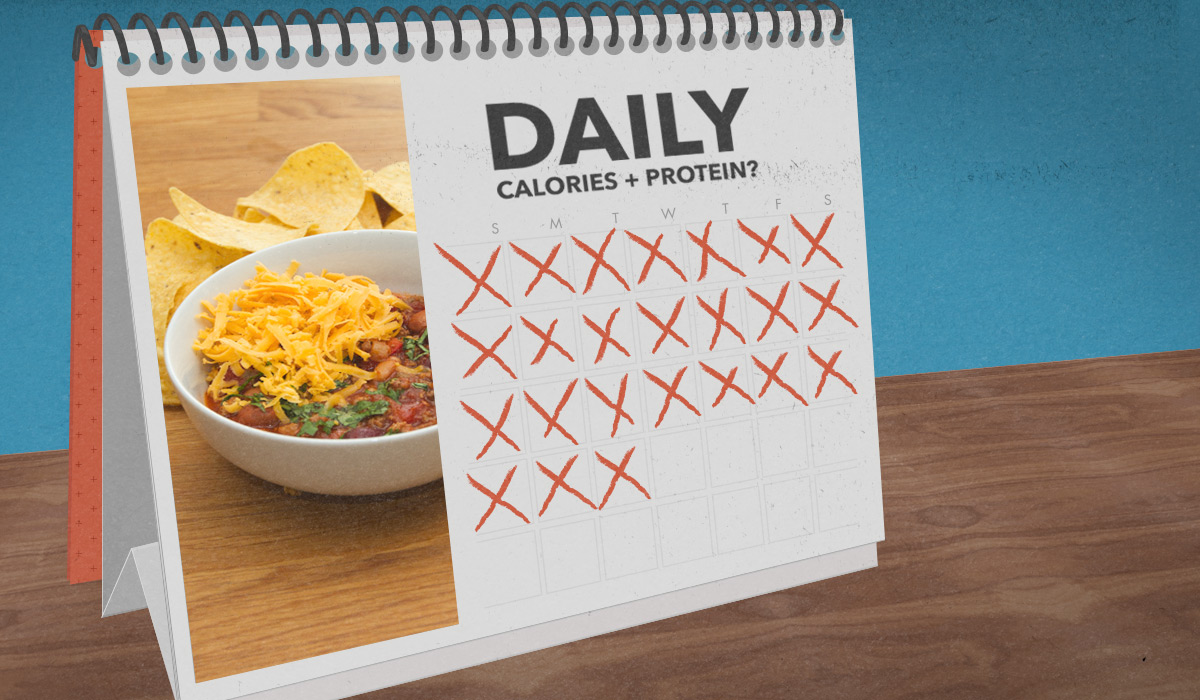
It’s going to take a lot of smart planning, effort, and consistency for quite a while in order to gain a significant amount of weight and muscle.
It doesn’t matter if what you’re doing is 100% optimal for gaining weight if the routine isn’t sustainable.
While your motivation is high, it’s easy to force yourself through the tougher parts of a plan. But eventually, some stressor will come into your life. If the routine isn’t easy to maintain, you’ll stop doing it. So your plan should not have parts that are too tough.
Getting a cold, worrying about losing your job, breaking up a long-term relationship—things like this can totally throw your routine out the window. Even vacations or holidays can replace a weight-gain routine with higher priorities like spending time with family.
It’s not realistic to think that you’ll never have something knock you off your plan. So your plan needs to be able to survive a good punch.
Focus on the 20% of what you’re doing that’s giving you 80% of your results.
- Eat enough food consistently
- Eat enough protein consistently
- Lift weights 3x a week consistently (and follow a good program!)
How can you do that?
The way to do that is by making all these things into habits so that you do them instinctively. If you want to know more about the science behind building a habit, check out our habit article. Here’s a quick breakdown:
- Goal-setting: Pick one tangible and realistic goal, such as gaining 5 pounds in 5 weeks.
- Make it easy to stick to the plan: Pick a program that’s designed well, change things in your environment to make it easier to stick to your goal (cook food and freeze it in advance, build a home gym if the gym is too far away, make small gradual changes to your diet, etc.), eat foods that are easy to eat lots of (liquids, dried fruits, etc.).
- Improve your willpower: Get enough sleep (which will also make your gains leaner.)
- Use willpower to get started: It takes 18-66 days to build a habit so consider using accountability as a failsafe such as betting with a friend to help you last that long. We recommend 5 weeks to start.
- A reward is part of habit building: Celebrate every milestone you reach. A milestones is something that is measurable and important in your progress. Not just regular ol’ stones a few feet ahead of you along the road.
Summary
If you’ve previously struggled with gaining weight, you now have the 5-step action plan of what you need to do. Here’s how it’d look with everything together.
- Get an evidence-based workout program designed to help skinny guys gain weight (like our Bony to Beastly Bulking Program)
- Go to the gym 3x a week
- Hit your energy goals daily, weekly, monthly
- Hit your protein goals daily, weekly, monthly
- Work on improving your sleep quantity and then quality
- Measure your progress weekly and adjust what you’re doing if it’s not working
- Use accountability to help you stick to the plan long term (that’s why our bulking program includes coaching in the member community)
Have you gained weight before? And what worked well for you? Do you have any questions we can help to answer? Share your thoughts in the comments section below.
Jared Polowick, has a degree in visual design from York University, and is a certified personal trainer (CPT). He founded Bony to Beastly, Bony to Bombshell, and Outlive. He gained over 40 pounds while resolving his chronic tendonitis, alopecia, and joint pain.
